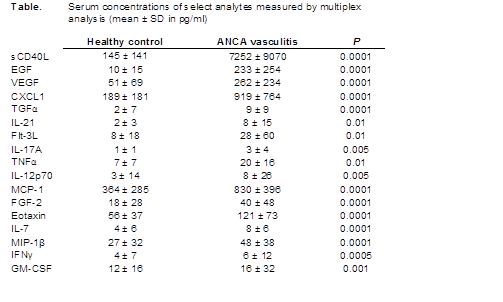Background/Purpose
ANCA vasculitis is characterized by the presence of autoantibodies directed against MPO, PR3 and other neutrophil proteins. Binding of these autoantibodies to activated neutrophils is thought to be an important driver of the pathology underlying this disease. To date, investigation of serum biomarkers in this patient population have been limited. A more comprehensive approach to defining the biomarker profile would aid in our understanding of the mechanisms underlying the disease, may point to novel therapeutic targets, and would aid in the definition of biomarkers to monitor disease activity and therapeutic response.
Methods
ANCA vasculitis (n=46) and healthy control (n=30) donor serum samples were obtained from commercial sources. Vasculitis samples were derived from patients with positive c-ANCA or p-ANCA patterns by immunofluorescence analysis. Anti-PR3 and anti-MPO autoantibody levels were measured by ELISA to assess autoantibody status of the vasculitis samples. Proteomic profiling was performed using SOMAscanTM and multiplexed analysis on the Luminex® platform.
Results
Measurement of anti-MPO and anti-PR3 antibodies in the ANCA vasculitis sera indicated that approximately one-third of the samples had detectable levels of one or the other of these most common autoantibodies. Multiplexed proteomic analysis of control and vasculitis serum samples revealed elevated TNFα, GM-CSF, IL-7, eotaxin, MCP-1, CXCL1, sCD40L, IL-21, growth factors such as VEGF, EGF, and FGF-2 (see Table). Increased levels for these analytes were observed with both conventional Luminex® multiplex assay and with the SOMAscanTM analysis that measures levels of more than 1,200 protein analytes. No clear difference in levels of these biomarkers was apparent in patient samples with or without detectable antibodies against MPO or PR3. Further analysis of the SOMAscanTM data indicated a pattern of increased levels of proteins in several classes. Across vasculitis serum samples, we observed an elevation in levels of biomarkers associated with angiogenesis, select inflammatory mediators, platelet activation and markers of tissue remodeling/repair. Interestingly we also observed clear increases in the levels of several autoantigens associated with this disease – MPO, PR3, lactoferrin and moesin. This finding is consistent with heightened neutrophil activation, and in patients with autoantibodies against these proteins, may drive immune complex-mediated inflammation.
Conclusion
A deep analysis of the biomarker profile of ANCA vasculitis serum revealed upregulation of pathways related to angiogenesis, neutrophil and platelet activation, and tissue repair. These data provide a view more comprehensive than previously reported of the altered serum profile in ANCA vasculitis patients and highlight candidate biomarkers to track disease activity and therapeutic responses.
Disclosure:
M. Parker,
MedImmune, LLC,
3;
D. Gold,
MedImmune, LLC,
3,
AstraZeneca,
1;
K. Ranade,
Medimmune, LLC,
3,
AstraZeneca,
1;
E. Grant,
MedImmune, LLC,
3,
AstraZeneca,
1.
« Back to 2014 ACR/ARHP Annual Meeting
ACR Meeting Abstracts - https://acrabstracts.org/abstract/proteomic-analysis-of-anca-vasculitis-serum-reveals-broad-neutrophil-activation-angiogenesis-and-selective-inflammatory-pathway-activation/

